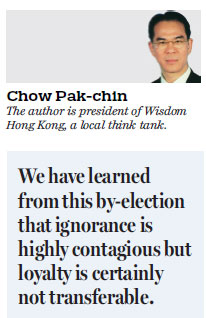Opposition camp learned a painful lesson on division
Updated: 2018-03-15 06:32
By Chow Pak-chin(HK Edition)
|
|||||||||
Failure to regain veto power and narrow winning margins show 'pan-democrats' that blanket voter support is by no means certain, Chow Pak-chin notes
In a world of diverse beliefs and practices one universal rule always holds true, transcending all cultures - "united we stand, divided we fall".
However, "pan-democrats" had a rather agonizing experience of the exact opposite of the social doctrine of solidarity; they were overwhelmed by dividedness.
At the weekend they lost their bid to regain veto power in the Legislative Council and managed to fill just two of the four by-election seats - the remainder went to their rivals. The seats were vacated by opposition lawmakers who were disqualified following improper oath-taking in late 2016.
Dividedness is the engine that drives self-destruction and this is undoubtedly a painful reminder for "pan-democrats" that division was a significant factor in their by-election defeat.

There are also a few other interesting observations worth noting. Firstly Edward Yiu Chung-yim, regarded as the anti-disqualification champion, lost his bid to return to the legislature. Yiu, one of the ousted lawmakers, shifted from running in a functional constituency in 2016 to a geographical constituency (Kowloon West) this time and lost. Yiu, with 105,060 votes, was defeated by Vincent Cheng Wing-shun of the pro-establishment Democratic Alliance for the Betterment and Progress of Hong Kong who drew 2,419 more ballots.
Yiu's tactical decision to run in Kowloon West did not pay off and exposed his thin support in the community, whereas the DAB is well-known for having a long history of established community work in many districts, including Kowloon West.
Secondly, Paul Zimmerman did the exact opposite - he ran in the geographical constituency as an independent candidate in 2016 and this time in a functional group, and he also lost.
Thirdly, Au Nok-hin won in Hong Kong Island for the "pan-democratic" camp. But with 137,181 votes, he was ahead of his strongest rival, Judy Chan Ka-pui of the pro-establishment New People's Party, by a narrow margin of less than 7 percent.
Another significant outcome was that the traditional "golden ratio" of 60 percent of votes going to "pan-democrats" and the remainder to the pro-establishment camp has been broken in this by-election, as clearly evidenced by the outcome in Hong Kong Island.
The by-election, which has unexpectedly shattered the legacy of the "golden ratio", could give rise to hopes that we are seeing a turning point where "pan-democrats" see their power diminishing. This might spell the beginning of the end for the "pan-democrats" tipping the scales in LegCo, specifically when it comes to vetoing motions or bills tabled by their rivals.
All these have exposed the extreme arrogance of "pan-democrats" and how wrong they were in believing voters were as eager as them to refill the vacated seats with more or less the same people (from the "pan-democratic" camp) who acted irresponsibly and handed over those seats given to them by the same voters. It was also naive on their part, as well as insulting, to assume voters would have forgotten and forgiven their recklessness in "surrendering" those seats to rivals in the first place.
Most importantly, it shows that the public have taken a stance to express disapproval of the anti-disqualification campaign and given the thumbs up to the Hong Kong Special Administrative Region Government for ousting this bloc of legislators-elect who botched their oath of office.
Furthermore, the January primary race staged by "pan-democrats" in a bid to put its best candidates forward for the by-election unintentionally exposed the ugly underbelly of political conflicts among the "pan-democrats" as well as their naivety.
During the primary, Yiu received the most votes to run in Kowloon West but since there were doubts as to whether the returning officer would let him run because of his previous disqualification, there was a backup plan to support the one with the second-highest number of votes, who turned out to be veteran politician Frederick Fung Kin-kee.
But the "pan-democrats" were split as to whether Fung would be the right choice. And when Fung volunteered to step down and not take part, "pan-democrats" were naive enough to believe Fung's supporters in his stronghold of Kowloon West would automatically transfer their votes to support another "pan-democratic" candidate.
The popular saying, "ignorance is bliss" comes to mind when describing this political debacle and the "pan-democrats" have certainly taken the biscuit. We have learned from this by-election that ignorance is highly contagious but loyalty is certainly not transferable.
(HK Edition 03/15/2018 page9)